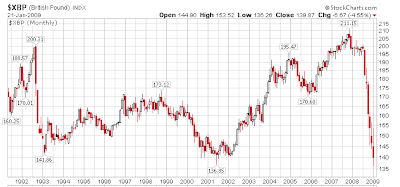http://globaleconomicanalysis.blogspot.com/2009/01/pound-sinks-as-britain-teeters-on-edge.htmlThe British Pound has imploded on fears of bank nationalization and Prime Minister Gordon Brown�s plan to give the Bank of England unprecedented powers to buy securities. This chart paints the not so pretty picture.
British Pound vs. US$ Monthly Chart Pound At Lowest Level Versus Dollar Since 1985
Pound At Lowest Level Versus Dollar Since 1985Bloomberg is reporting Pound Falls to Lowest Versus Dollar Since 1985 on Bank Concern.
The pound fell to its weakest level against the dollar since Margaret Thatcher was U.K. prime minister and dropped to a record against the yen for a second day on speculation the government will nationalize banks.
�The U.K.�s imploding,� said Jonathan Gencher, Toronto- based director of currency sales at BMO Capital Markets, a unit of Canada�s fourth-largest bank. �You have all the concern about the financial sector and which banks are going to be nationalized. You have expectations that the Bank of England is going to be moving toward zero interest rates. That�s weighing on the pound.�
.....................................................................................................................................................................................
http://www.nakedcapitalism.com/2009/01/is-sterling-about-to-tank.htmlIs Sterling About to Tank?Willem Buiter, who had a ringside seat at the Iceland meltdown, warned that the UK could follow back in November:
With the pound sterling dropping like a stone against most other currencies and credit default swap rates on long-term UK sovereign debt beginning to edge up, this is a good time to revisit a suggestion I made earlier on a number of occasions (e.g. here, here and here), that there is a non-trivial risk of the UK becoming the next Iceland.
The risk of a triple crisis - a banking crisis, a currency crisis and a sovereign debt default crisis - is always there for countries that are afflicted with the inconsistent quartet identified by Anne Sibert and myself in our work on Iceland: (1) a small country with (2) a large internationally exposed banking sector, (3) a currency that is not a global reserve currency and (4) limited fiscal capacity.
In the rest of a quite long and detailed post he shows how the UK is indeed at risk.
Fast forward, today we have a post from Ambrose Evans-Pritchard on the plight of the pound. Even by his standards (he has a great fondness for apocalyptic views), he is, as he warns, "Seriously Alarmed":
The slide in sterling has turned "disorderly"....
For the first time since this crisis began eighteen months ago, I am seriously worried that British government is losing control.
The currency has fallen five cents today to $1.39 against the dollar. It is now perched precariously on a two-decade support line -- the levels tested in 2001 and 1992. If it breaks that line, traders may send it crashing down towards dollar parity.
The danger is blindingly obvious. The $4.4 trillion of foreign liabilities accumulated by UK banks are twice the size of the British economy. UK foreign reserves are virtually nothing at $60.6bn. (on this, more later in a piece I'm writing today)